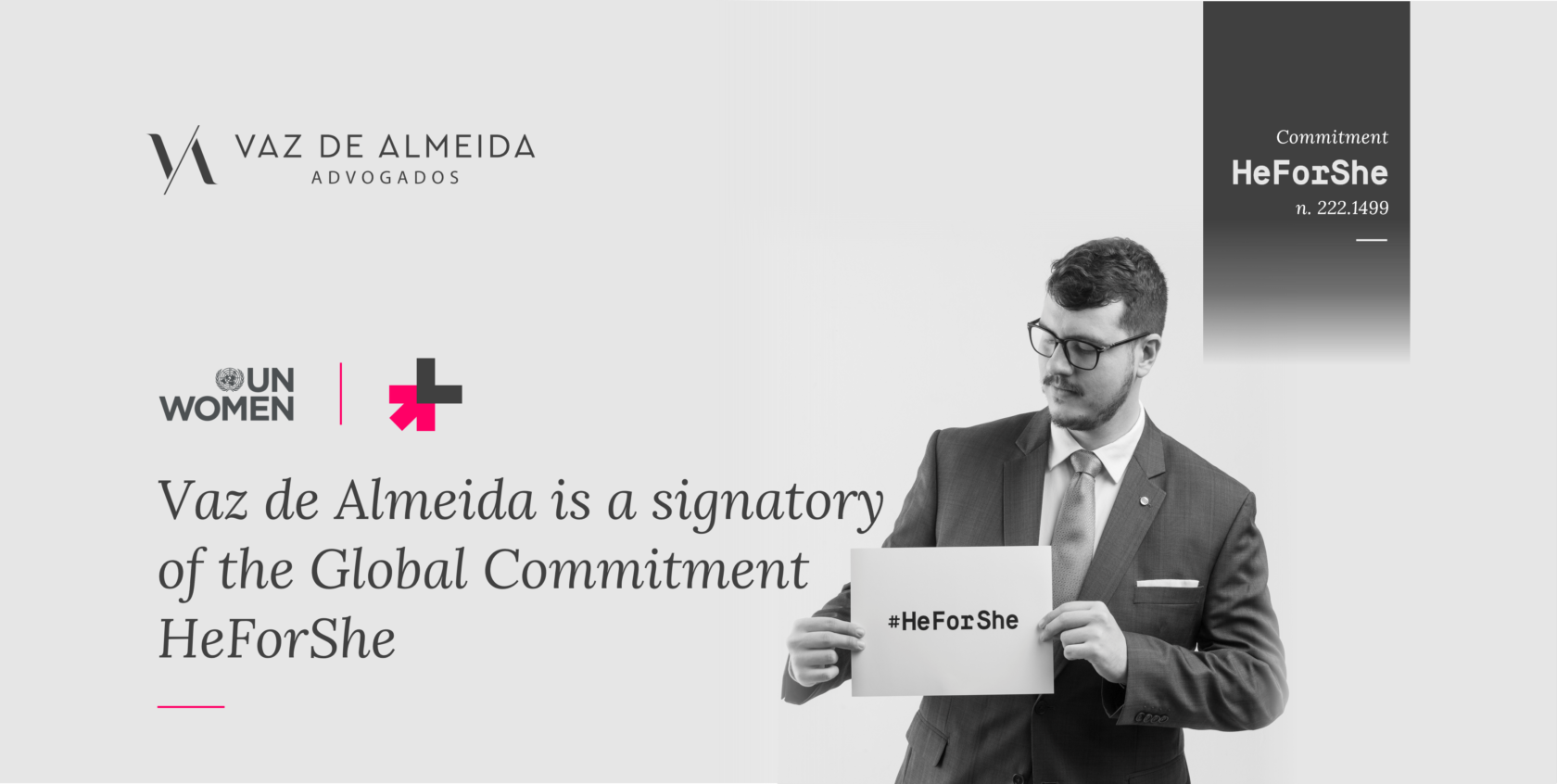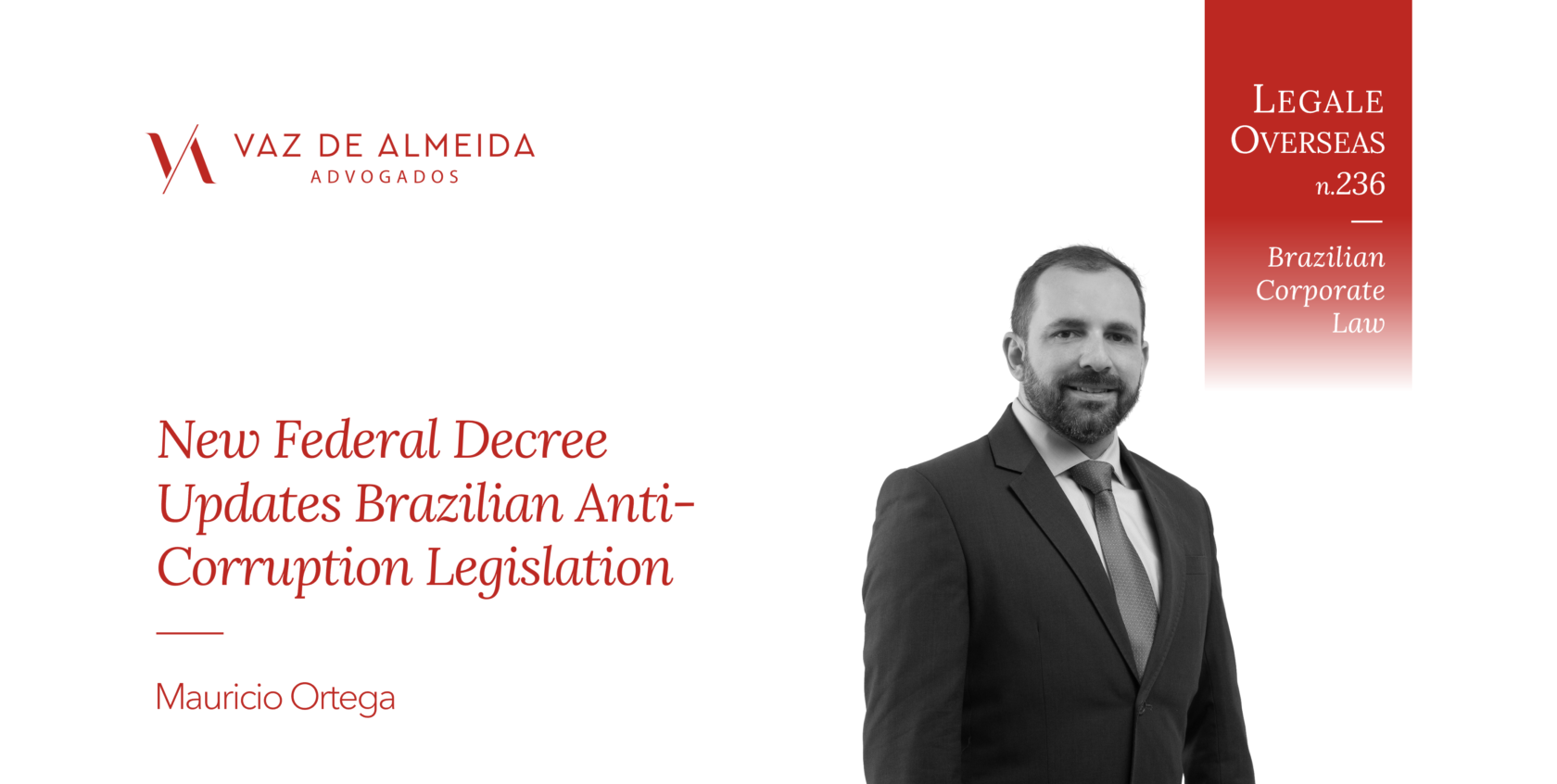The decree responsible for the amendment of the Anti-Corruption Law introduces changes and incorporates guidelines previously adopted by the Office of the Federal Controller General (CGU) to standardize and define concepts and procedures.
By Mauricio Ortega.
―
Legale Overseas, No. 236.
Decree No. 11,129/2022 was enacted on July 12, 2022, revoking Decree No. 8,420/2015, and establishing new regulations in connection with Brazil’s Anti-Corruption Law (Law No. 12,846/2013). Effective from July 18, 2022, the decree applies to ongoing administrative enforcement proceedings and leniency agreement negotiations, excluding acts before this date. A redline version comparing the changes between Decree No. 11,129/2022 and Decree No. 8,420/2015 is available here:
Preliminary investigations
The new decree contains guidelines for opening preliminary investigations prior to the start of administrative enforcement proceedings, which the Federal Controller General’s Office (CGU) had previously adopted via CGU Normative Instruction No. 13/2019. The guidelines authorize the CGU to conduct certain investigations ― where some are subject to court authorization, including requests for sharing tax information and search and seizure warrants. Preliminary investigations must be completed within 180 days, this timeframe may only be extended with the authorization of the internal affairs department of the government entity with legal jurisdiction to conduct the investigation.
Changes to administrative enforcement proceedings
Decree No. 11,129/2022 also contains more elaborate provisions for administrative enforcement proceedings while both including and improving previously established procedures from CGU Normative Instruction No. 13/2019. Among the new procedures, Decree No. 11,129/2022 sets forth that the administrative enforcement commission must prepare administrative charges containing:
/ A clear and objective description of the harmful acts the legal entity is alleged to have committed and the relevant circumstances;
/ Adequate evidence to support the formal accusation; and
/ The specific legal grounds for the charges.
Also introduced in the decree is the possibility of using the same enforcement proceedings to investigate alleged violations of the Anti-Corruption Law and administrative infractions under the New Public Procurement Law (Law No. 14,133/2021). However, in contrast to the previous regulations, the decree was enacted without specific wording regarding the need for proceedings to remain confidential in order to preserve the images of those involved. Therefore, additional efforts may now be required to secure the confidentiality of investigations and whistleblowers.
The decree also provides for the possibility of suspending administrative enforcement proceedings by initiating leniency negotiations. The suspension of the proceedings may now occur at the CGU’s discretion, without prejudice to the continuation of the investigative measures necessary to clarify the facts or the adoption of precautionary and protective procedural measures to avoid the loss of rights or ensure the evidence production stage is conducted.
Changes to calculating undue advantage
The decree defines improper advantage as gains or benefits the legal entity obtains (or intends to obtain) that result directly or indirectly from harmful acts. There are three different methods for calculating undue advantage:
/ Identifying the total amount of revenue earned in an administrative contract (and its amendments) and deducting the legitimate costs the legal entity can prove are attributable to the contract;
/ Identifying the total amount of expenses or costs avoided, including tax or regulatory costs;
/ Estimating the additional profit earned from an action or omission by the government, which would not have occurred had the legal entity not committed any misconduct.
The regulation emphasizes that financial sums paid as bribes to public authorities or related third parties must not be treated as deductible expenses when calculating the amount of profit.
Changes to aggravating and mitigating factors
Significant changes to how penalties provided for in the Anti-Corruption Law, introduced in the decree No. 11,129/2022, are calculated, significantly changing the percentages used to calculate fines. The tables below outline the changes to the aggravating and mitigating factors used in the calculations:
Aggravating Factors
Changes to aggravating factors for calculating fines
Continuous Harmful Acts / From 1% to 2.5% / N/A
factor / previous decree / decree No. 11,129
Multiple Harmful Acts / N/A / Up to 4%
factor / previous decree / decree No. 11,129
Tolerance or Awareness of Harmful Acts by the Entity’s Governing or Management Body / From 1% to 2.5% / Up to 3%
factor / previous decree / decree No. 11,129
Recidivism / 5% / 3%
factor / previous decree / decree No. 11,129
Interruption of the Execution of a Public Contract / From 1% to 4% / Up to 4%
factor / previous decree / decree No. 11,129
Economic Situation (General Solvency and General Liquidity Indices) / 1% / 1%
factor / previous decree / decree No. 11,129
Contract Value:
Greater than BRL 500,000 / N/A / 1%
factor / previous decree / decree No. 11,129
Greater than BRL 1.5 million / 1% / 2%
factor / previous decree / decree No. 11,129
Greater than BRL 10 million / 2% / 3%
factor / previous decree / decree No. 11,129
Greater than BRL 50 million / 3% / 4%
factor / previous decree / decree No. 11,129
Greater than BRL 250 million / 4% / 5%
factor / previous decree / decree No. 11,129
Greater than BRL 1 billion / 5% / N/A
factor / previous decree / decree No. 11,129
Mitigating Factors
Changes to mitigating factors for calculating fines
The Infraction does not Actually Occur / 1% / Up to 0,5%
factor / previous decree / decree No. 11,129
Compensation for Damages / 1.5% / N/A
factor / previous decree / decree No. 11,129
Spontaneous Payment of Undue Advantage and Compensation for Damages or na Absence or Lack of Proof of Undue Advantage or Damage / N/A / Up to 1%
factor / previous decree / decree No. 11,129
Cooperating with the Investigation of the Harmful Act / From 1% to 1.5% / Up to 1.5%
factor / previous decree / decree No. 11,129
Spontaneous Communication/ Voluntary Admission / 2% / Up to 2%
factor / previous decree / decree No. 11,129
Proof of the Existence and Implementation of a Compliance Program / Up to 4% / Up to 5%
factor / previous decree / decree No. 11,129
Leniency agreements
Decree No. 11,129/2022 establishes that the CGU can now negotiate, execute, and monitor leniency agreements for harmful acts against other government branches, such as state and municipal authorities. Moreover, financial sums paid to cover damages can be used as a credit against other penalties imposed by other authorities when these penalties are related to the same facts covered by the scope of the leniency agreement.
The decree enables the renegotiation of leniency agreements provided certain requirements are met. These include maintaining the results and original requirements the leniency agreement was based on, greater advantages for the public administration, and the cooperating legal entity’s good faith in committing to fulfilling an obligation before its deadline.
Decree No. 11,129/2022 also sets rules for cooperation between the CGU and the General Counsel of the Federal Government (AGU) and provides that the AGU’s participation may lead to a joint resolution of the civil penalties established in the Anti-Corruption Law. Furthermore, negotiations for executing leniency agreements and monitoring their performance will be regulated further by a joint act issued by the CGU’s Minister of State and the AGU.
Corporate integrity programs
Regarding corporate integrity programs, Decree No. 11,129/2022 emphasizes the need for legal entities to implement efficient and robust corporate governance and encourages them to uphold a culture of integrity. Updated, by the decree, the wording of previously established factors used to determine the effectiveness of corporate integrity programs. Also reemphasizing the need for legal entities to adopt effective risk management and adequate due diligence procedures, especially when hiring third parties, Politically Exposed Persons (PEPs), and providing and supervising sponsorships and donations. At last, the decree explains that the CGU’s process for evaluating corporate integrity programs will consider the legal entity’s revenue and corporate governance structure, in addition to the aspects already described above.
―
People and Community >
Meet our Leaders >
Awards, Nominations and Recognitions >
INSIGHTS, our News Portal >
―
Tax >
Corporate Law >
Conflict Prevention and Resolution >
Relations of the Automotive Industry >
Labour Relations, Global Mobility and People Management >
Intellectual Property >
Innovation, Digital Law and Cybersecurity >
ESG / Environmental Law and Sustainability >
Infrastructure, Real Estate Law and Construction >
Administrative Law, Public Law and Government Relations >
―
Focussing on what really matters ― We are an independent law firm, dedicated to providing legal support for the international operations and investments of foreign companies in Brazil and the internationalization of Brazilian companies, from preparation to support in the destination countries. Our Purpose is to identify and catalyze the best business opportunities, clearing the barriers that compromise our Clients’ time and energy, so that they can focus on the work that really matters: exceeding the expectations of their shareholders. We are not just lawyers. We are business consultants and strategists. Our ambition is to make the world a better place through our work and contribute to the improvement of the Brazilian business environment, positively influencing the leaders we deal with, as well as balancing, in a consistent and sustainable way, the creation of value for our clients with the creation of value for our professionals and the community.
―
Non-negotiable boundaries ― Either one has integrity, or one has nothing. Our company prides itself of the care it gives to every ethical aspect of human relations and of everyday work, ensuring that our team never crosses the line of no return. That is why we hold the highest standard of internal demand, guaranteeing that every deal is made only for the advantages of its terms. We do not restrain ourselves to the strict observance of Brazilian Law and the Law of the countries of origin of the corporations and investors we deal with, alone. In addition, we follow all the indications of the «United Nations Convention against Corruption» as well as the «Convention on Combating Bribery of Foreign Officials in International Business Transactions» of the Organization for Economic Cooperation and Development (OECD). We also follow the guidelines about «Good Practice Guidance on Internal Controls, Ethics and Compliance» (2009), as well as the «Guidelines for Multinational Enterprises » (2011), both issued by the OECD. We believe, that doing the right thing is good for business, and that honest work strengthens the belief, that despair over the ways of the world shall not prevail.
―
Meet our Editor >
―
+55 19 3252-4324
Barão de Itapura, 2323
8° floor, Guanabara
Campinas SP
Brazil
News Portal
Center for Communication



